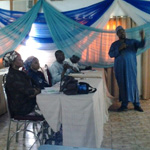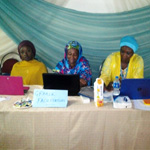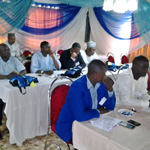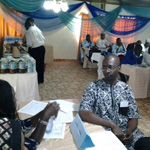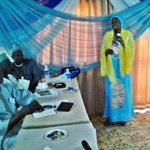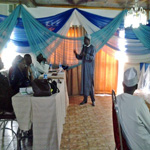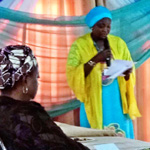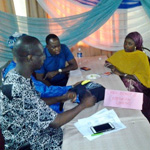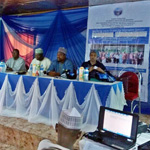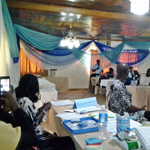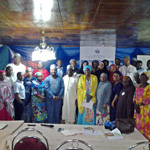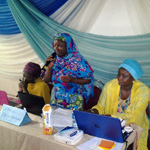Strengthening Capacity for Sexual and Reproductive health research through Online Training
2nd Annual GFMER Scientific Session Report

Organized by
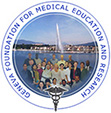

Geneva Foundation for Medical Education and Research (GFMER)
in Partnership with
Epidemiology Unit, Ministry of Health and Human Services, Kaduna State, Nigeria
Saturday 1st April 2017
Tafawa Balewa Guest Inn, 10 Tafawa Balewa Way. Unguwar Rimi G.R.A, Kaduna State, Nigeria
Acknowledgements
This report has been prepared by Dr. Aisha Abubakar-Sadiq, Nigeria’s Country coordinator for Geneva Foundation for medical education and research (GFMER). The session was facilitated by Dr Aisha Abubakar Sadiq and GFMER Country supervisor Mrs. Sabaatu Danladi. They were assisted by SRHR Graduate 2016 Dr Hajara Kera, Dr Obafemi Babalola of Nigeria Field Epidemiology and Laboratory Training Programme (NFELTP) and Mr. Victor Mcdikoh of Kaduna State Primary Healthcare Development Agency (KSPHCDA) who served as the master of ceremony (MC).
The organizers are grateful to the Kaduna State Government, Staff of the planning department Ministry of Health and Human Services and Tafawa Balewa Guest inn for assisting with planning and technical support for the event.
The organizers appreciate the support of GFMER, Switzerland and the entire faculty and staff of its online sexual and reproductive health research course.
I express my profound gratitude and regards to the following persons, who contributed their time in secretarial and technical support at the session: Assoc. Prof. Abdullahi Jibrin Randawa, Dr Isa Abdulkadir, Dr Paul Manya Dogo (Commissioner Ministry of health/human services), Dr. Amina Mohammed Baloni (UNICEF), Mrs. Sabaatu Danladi (GFMER Supervisor), Dr Aisha Abubakar (HOD Community medicine, ABUTH, Zaria), Dr Afolabi (Head of reproductive Health, FMoH, Abuja), Aisha Aliyu, Ms. Lucy Abet, Mr. Haruna, Aisha Usman, Mathew Jacob, Tijjani Abubakar and the Nigeria Medical Association (NMA). I acknowledge Miss Khayri Mukhtar Usman (Khayri’s Pride) and her team for ensuring the quality of gift items available for participants.
We acknowledge the continued support and commitment of GFMER / partners in Universities in providing training to healthcare workers especially in sub-Saharan Africa with existing barriers in access to qualitative post-graduate education in sexual and reproductive health.
Dr. Aishatu Abubakar Sadiq
State Epidemiologist- Kaduna State
Country Coordinator- GFMER
April 2017
Welcome address by Dr. Aishatu Abubakar Sadiq
Good Morning Honorable Commissioner, Senior Colleagues, Colleagues, Ladies and Gentlemen
You are welcome to the 2nd Annual Geneva Foundation for Medical Education (GFMER) Scientific session. GFMER, Switzerland was established in 2002 as a non-profit organization collaborating with the World Health Organization (WHO), Head office-Geneva in all aspects of education/ research in sexual and reproductive health. The Foundation has one sole objective: to furnish opportunities for medical training and research in developing countries and those countries in economic transition (Presently we fulfill both criteria). To achieve this foundation converted its residential training in sexual and reproductive health to an online course. Largely to provide opportunities for health care workers in developing countries to access a ‘’treasure trove’’ of knowledge, literature, Global contacts and available partnerships and support from Global Universities in health care Provision.
Nigeria has consistently maintained a high birth rate in the Global rankings. Kaduna State as the third most populous State in Nigeria, with an estimated population of 7.1 million, includes 1.4 million women of reproductive age. The State has a young and growing population, with 44% of the population under 15 years and an annual growth rate of 2.47 percent. This indicates a need for more interventions targeted at this growing demographic to ensure sustained improvements in maternal and child healthcare provision. Support for training and healthcare Project implementation by the foundation will provide needed improvement in skills and services.
Last year certain recommendations were proposed at the end of the scientific meeting, thus far the following have been achieved: CME certification by NMA for all graduates of the 7 month SRHR course who present certificates of completion, Awarding of CME Credits at scientific sessions, Subsidization of course fee (from 500 dollars to 250 dollars) for all registered Nigerian Medical Doctors with proof of registration at course commencement and lastly scheduling of scientific meetings to weekends to ensure full attendance/participation.
Today’s session aims to provide: A forum to discuss issues in sexual and reproductive health, encourage free exchange of ideas among participants, establish and strengthen linkages between public/private institutions involved in SRH in Nigeria.
I once again welcome you all and look to forward to greater opportunities for partnerships/training in healthcare provision.
Thank you
Background
Since 2003 the Geneva Foundation for Medical Education and Research (GFMER), in partnership with the World Health Organization (WHO) and other partner institutions, has organized a training course on sexual and reproductive health research. The course focuses on research methodology and attracts participation of health professionals from different countries and particularly from developing countries. In order to reach more health professionals, in 2010 GFMER in collaboration with world health organization (WHO) and other partners launched the online course on sexual and reproductive health research. "From Research to Practice: Training Course in Sexual and Reproductive Health Research" that offers a training package specially developed for those health professionals involved in research, whose access to learning is limited by time, financial resources or other constraints and for whom access to quality education and learning is limited. The program is designed to meet a wide range of contemporary issues in sexual and reproductive health, especially in developing countries. It helps students to better identify the problems related to reproductive and sexual health, it helps to improve the skills of caregivers, and it promotes good practices.
Selected Participants from the GFMER online course in sexual and reproductive health research (SRHR) spend one week in Geneva at an intensive research workshop. Some graduates continue with the foundation as country advisors and co-coordinators responsible for supporting training and dissemination of information on the foundation and its training programmes. The foundation in 2011 in partnership with the Macarthur foundation organized a training session for healthcare workers in Sokoto state, Nigeria.
In 2016 a one day scientific and information session was organized in Kaduna State in Partnership with the Epidemiology Unit, Ministry of health. It focused on maternal mortality and Adolescent Health topics. Participants were drawn from Ministries of Health, Health facilities and Partner organizations involved in sexual and reproductive health within Nigeria. Participants at the Scientific meeting proposed certain recommendations; thus far the following have been achieved: CME certification by NMA for all graduates of the 7 month SRHR course who present certificates of completion, Awarding of CME Credits at scientific sessions, Subsidization of course fee (from 500 dollars to 250 dollars) for all registered Nigerian Medical Doctors with proof of registration at course commencement and lastly scheduling of scientific meetings to weekends to ensure full attendance/participation.
The 2nd Annual Scientific session of GFMER-SRHR in Nigeria will serve to further training and research opportunities for health care workers in the field of human reproduction through provision of a consistent forum to discuss relevant scientific developments/research in the field, ongoing community level interventions and introduce the online training course of Sexual and reproductive health research. The session was organized around the core modules of the training course with presentations on Congenital Anomalies, Maternal Mental health in Nigeria, Early Child Development (ECD), Preterm Project and Group discussions on research Methodology. (See Appendix 1 for workshop agenda).
The main objectives of the one day session were to; provide a forum to discuss emerging topics in sexual and reproductive health, encourage free exchange of ideas among participants, establish and strengthen linkages between public/private institutions involved in SRH in Nigeria.
Keynote address
TOPIC 1: Congenital Anomalies in Nigeria: Challenges and ways forward
Dr Isa Abdulkadir (Consultant Pediatrician/neonatologist)
Guest Speaker: Assoc. Prof Abdullahi Randawa
TOPIC 2: Maternal Mental Health in Northern Nigeria: A neglected Reality
GFMER Presentations:
TOPIC 3: Early Child Development (ECD)/ Preterm Project
TOPIC 4: Introduction to Online Sexual and Reproductive Health Training (SRHR)
GFMER Coordinator: Dr Aishatu Abubakar-Sadiq
Profile of the participants
70 participants who attended the workshop were selected from departments of obstetrics & gynecology in health facilities, departments of pediatrics in health facilities, UNICEF, WHO, National Blood Transfusion Service (NBTS), UNFPA, Reproductive Unit-Federal ministry of health, State Ministry of health, media, Public/private hospitals, Nursing/midwifery council, Nigeria Medical association (NMA), Kaduna State University (KASU), Nigeria Field epidemiology and Laboratory training Programme (NFELTP), Federation of Muslim women’s association of Nigeria (FOMWAN), Midwives service scheme (MSS), National Health Insurance Scheme (NHIS), Malaria Control Program (MCP), State Primary healthcare development Agency (KSPHCDA) and Kaduna State Action committee on Aids (KADSACA). Participants comprised of Medical Doctors, Nurses, Program officers and reproductive health officers from Key organizations. A representative of the Emirate council was present on behalf of the traditional leaders in the State. There were 38 women and 32 men in attendance for the session.
Performance and end of session feedback
The session lasted from 9:30am-3:30pm with presentations in the morning and discussion groups around the core module topics/ research methodology after lunch. Participants were divided into 4 groups (Adolescent health, maternal/perinatal health, sexually transmitted infections and community genetics/child health). Each group was asked to generate two relevant research topics on its thematic area, provide a clear problem statement/justification and outline 3-4 objectives of the proposed study. Representatives of each group presented their work via power-point and were reviewed by all participants.
Each participant received a monogrammed African print ‘’GFMER’’ gift bag containing hard copies of the SRHR course brochure, SRHR Course guide, leather bound notebook, monogrammed coffee carrier cups and monogrammed face towels. E-copies of all presentations and SRHR materials were sent to participants on conclusion of the workshop.
Conclusions
Main conclusions arrived at the end of the day include:
- Need to continue holding scientific sessions and sexual / reproductive health and expansion of attendance to include more participants from other regions of the country.
- The need to implement community genetics services to provide screening in rural communities and health education regarding consanguineous marriages.
- The Nigeria Medical Association (NMA) include GFMER presentations on sexual and reproductive health topics as part of their annual General meetings (AGM) each year with medical practitioners present in large numbers from the whole country.
- The Ministry of health should organize trainings for Nurses and Doctors on diagnosis and screening of maternal mental health disorders.
- GFMER design and introduce an online adolescent counseling/ health module for use in training adolescent counselors within Nigeria and Globally to improve healthcare provision.
- Commended the GFMER Nigeria Faculty for organizing the scientific meeting and requested greater partnerships in training at the health facility level for clinical staff.
- The foundation GFMER Organize more information sessions in partnership with teaching hospitals to introduce residents in related specialties; OBGYN and pediatrics to the course. In order to fill the absence of intensive research training in their residency programmes within Nigerian Teaching Hospitals.
- Participants also commended the NMA for awarding 5 CME Credits to all participants in the spirit of continuing medical education in the country.
Workshop agenda
|
TOPIC |
TIME |
PRESENTER |
ORGANISATION |
|
Opening Prayer |
9:00-9:15AM |
MC/All |
Ministry of Health/GFMER |
|
Introduction of Guests Welcome address |
9:15-9:20AM 9:20-9:30AM |
MC Dr Aisha Abubakar-Sadiq |
CC GFMER, Switzerland |
|
Keynote Lecture Topic 1: Epidemiology and Management of Congenital Anomalies in Nigeria Q&A |
9:30-10:30AM |
Dr Isa Abdulkadir |
Ahmadu Bello University Teaching Hospital, Shika, Kaduna State |
|
Introductory Paper Topic 2: Introduction to GFMER)/ Online Sexual and Reproductive Health Research Post-graduate Training (SRHR) Topic 3: Early child development (ECD)/ Preterm project Q&A |
10:45-11:15AM
|
Mrs. Sabaatu Danladi/ Dr Aisha AS Dr Aisha Abubakar-Sadiq |
GFMER supervisors- Nigeria
|
|
Guest Lecture Topic 4: Maternal Mental Disorders in Northern Nigeria |
12:00-1:00PM |
Professor Abdullahi Randawa |
Ahmadu Bello University Teaching Hospital, Shika, Kaduna State |
|
Topic 5: Research Methodology GROUP DISCUSSIONS: Adolescent Sexual and Reproductive Health Sexually transmitted Infections/ HIV Community Genetics/ Child health Maternal and Perinatal Health
|
2:00-3:30PM |
Dr Aisha Abubakar-Sadiq Sabaatu Danladi Dr Aisha Abubakar Dr Obafemi Babalola Dr Hajara Kera |
GFMER, Switzerland GFMER, Switzerland HOD Commed ABUTH NFELTP/National Psychiatric hospital SRHR Graduate 2016 |
Images

